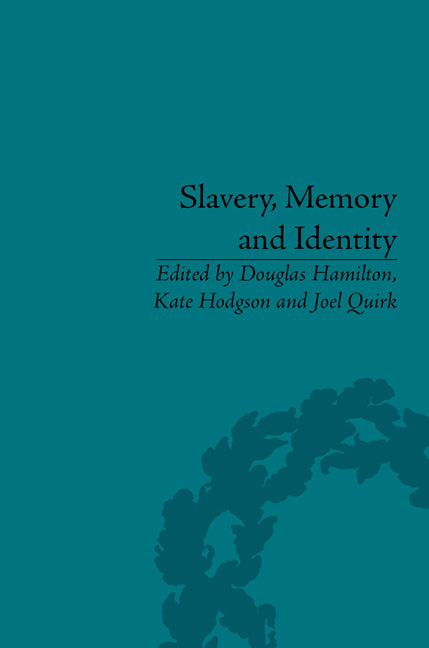Book contents
- Frontmatter
- CONTENTS
- Acknowledgements
- List of Contributors
- Introduction: Slavery, Memory and Identity: National Representations and Global Legacies
- 1 ‘A Thoroughly National Work’: The Politics of Blame and European Abolitionist Identities
- 2 From Slave Quarters to Wigwams: Native American Slaveholding and the Debate over Civilization
- 3 For Civilization's Sake: Legal Abolition of Slavery in Nepal and Sierra Leone in a Global Perspective, 1920–30
- 4 The Heritage of Slavery and Nation Building: A Comparison of South Africa and Mauritius
- 5 Picturing Slavery: The Perils and Promise of Representations of Slavery in the United States, the Bahamas and England
- 6 ‘History Must be Re-Written!’: Revisionist Ambitions among West African Slave Descendants
- 7 Contrapuntal Memories of Slavery and Abolition in the French-Speaking World
- 8 Public Memory of Slavery in Brazil
- 9 Learning to Remember and Imagine Slavery: The Pedagogies of Museum Field Trips in the Representation of ‘Difficult’ Histories
- 10 Slavery and Racism as the ‘Wrongs’ of (European) History: Reflections from a Study on Portuguese Textbooks
- Notes
- Index
7 - Contrapuntal Memories of Slavery and Abolition in the French-Speaking World
- Frontmatter
- CONTENTS
- Acknowledgements
- List of Contributors
- Introduction: Slavery, Memory and Identity: National Representations and Global Legacies
- 1 ‘A Thoroughly National Work’: The Politics of Blame and European Abolitionist Identities
- 2 From Slave Quarters to Wigwams: Native American Slaveholding and the Debate over Civilization
- 3 For Civilization's Sake: Legal Abolition of Slavery in Nepal and Sierra Leone in a Global Perspective, 1920–30
- 4 The Heritage of Slavery and Nation Building: A Comparison of South Africa and Mauritius
- 5 Picturing Slavery: The Perils and Promise of Representations of Slavery in the United States, the Bahamas and England
- 6 ‘History Must be Re-Written!’: Revisionist Ambitions among West African Slave Descendants
- 7 Contrapuntal Memories of Slavery and Abolition in the French-Speaking World
- 8 Public Memory of Slavery in Brazil
- 9 Learning to Remember and Imagine Slavery: The Pedagogies of Museum Field Trips in the Representation of ‘Difficult’ Histories
- 10 Slavery and Racism as the ‘Wrongs’ of (European) History: Reflections from a Study on Portuguese Textbooks
- Notes
- Index
Summary
How can it be permissible to say ‘you must remember’, hence speak of memory in the imperative mood, although it is characteristic of memory to emerge as a spontaneous evocation?
– P. Ricoeur, Memory, History, Forgetting (2004)There exists not one memory but many, varied memories of the slave trade and of slavery. They were not formed in the same way in Guadeloupe, Martinique, Guyana, Reunion, Africa, Madagascar and in France, and it is essential to study the different ways they came about. This work has begun but there is still much to do.
In the recent history of French republicanism, the victory of France – as the host nation – in the 1998 World Cup provides a remarkable case study for those interested in questions of belonging, of inclusion and exclusion, and of the construction and policing of national identity. The presentation of the culturally and ethnically diverse French team as the modern nation in miniature now seems prematurely celebratory, especially in light of subsequent events on and off the football pitch. There is no denying, however, that the 1998 World Cup permitted discussion, often hitherto obscured, of what commentators have dubbed the ‘colonial fracture’ at the heart of French society. It allowed, at the same time, the politicization of key players in the team, a number of whom subsequently became prominent public voices on issues of racism and the contemporary legacies of slavery in France and the French-speaking world. This latter shift is significant, for in addition to hosting the World Cup, France also commemorated in 1998 the 150th anniversary of the abolition of slavery in the French colonial empire.
In his 2010 book Soccer Empire: The World Cup and the Future of France, Laurent Dubois focuses on key moments in which these two ostensibly very different sets of events collided. A commemorative T-shirt produced in 1998 featured an image of one of the major lieux de mémoire of slavery in the French Atlantic: the maison des esclaves (house of slaves) on Gorée island, in Senegal.
- Type
- Chapter
- Information
- Slavery, Memory and IdentityNational Representations and Global Legacies, pp. 105 - 114Publisher: Pickering & ChattoFirst published in: 2014



